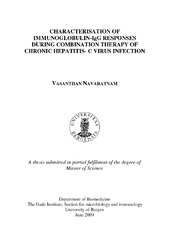| dc.contributor.author | Navaratnam, Vasanthan | en_US |
| dc.date.accessioned | 2009-08-31T13:23:14Z | |
| dc.date.available | 2009-08-31T13:23:14Z | |
| dc.date.issued | 2009-06-02 | eng |
| dc.date.submitted | 2009-06-02 | eng |
| dc.identifier.uri | https://hdl.handle.net/1956/3421 | |
| dc.description.abstract | Current recommended treatment of chronic hepatitis C is the combination of peg interferon and ribavirin. Ribavirin has shown that it poses both direct and indirect action mechanisms against several DNA and RNA viruses. Interferon is a potent immune modulating substance, but its effect on the immune system of HCV-infected patients during treatment is not known in detail. It has been shown that interferon induces a significant increase in total IgG and C1 inhibitor (INH) in patients with MS. The primary aim of this work was to study the effects of the combination therapy on the immunoglobulin levels. More specifically to see whether, the increased IgG levels were primarily due to HCV antibodies or whether antibodies to other viruses such as adenovirus, measles virus, and rubella virus are also increased. Sera from 24 patients in the NORDynamIC study at Haukeland University Hospital between February 2004 and March 2006 were used. Combination therapy with ribavirin and peginterferon was given for 12 or 24 weeks. Total IgG level, anti-HCV level, and antibodies to rubella, adeno and morbilli viruses were studied at different time points over 48 weeks. Total IgG level was fluctuating during the period of study. The highest level of IgG was found at day 8 whereas the lowest level was found at week 8 of treatment. Those who responded to the combination therapy showed a declining level of total IgG even after cessation of therapy while the non-responders showed an increased level og IgG after cessation of therapy. The relationship between IgG and anti-HCV levels showed the same pattern in responders whereas in non-responders total IgG show considerable variation and did not follow anti-HCV levels as observed in responders. All patients were anti-rubella IgG positive and there is a correspondence between the mean rubella antibody levels and mean IgG levels both in responders and non-responders. Most of the sera had no reactivity to either adeno virus or morbilli virus and there was no correspondence between antibody levels for morbilli or adeno viruses and total IgG. The study concludes that there seems to be an effect of combination therapy on total IgG and total IgG levels corresponds well with the anti-HCV antibody levels in responders. Rubella antibody was increased in all chronic HCV patients in the study and seems to have relationship with the total IgG level. Antibodies to adeno and morbilli viruses were not influenced by the treatment. | en_US |
| dc.format.extent | 947753 bytes | eng |
| dc.format.mimetype | application/pdf | eng |
| dc.language.iso | eng | eng |
| dc.publisher | The University of Bergen | eng |
| dc.subject | Hepatitis C | eng |
| dc.subject | Virus | eng |
| dc.title | Characterisation of Immunoglobulin--IgG Responses During Combination Therapy of Chronic Hepatits-C Virus Infection | en_US |
| dc.type | Master thesis | |
| dc.rights.holder | Copyright the author. All rights reserved | |
| dc.rights.holder | The author | |
| dc.description.degree | Master i Humanbiologiske fag - Medisinsk cellebiologi | |
| dc.description.localcode | HUCEL395 | |
| dc.description.localcode | MAMD-HUCEL | |
| dc.subject.nus | 751910 | eng |
| dc.subject.nsi | VDP::Medisinske Fag: 700::Basale medisinske, odontologiske og veterinærmedisinske fag: 710 | nob |
| fs.subjectcode | HUCEL395 | |
